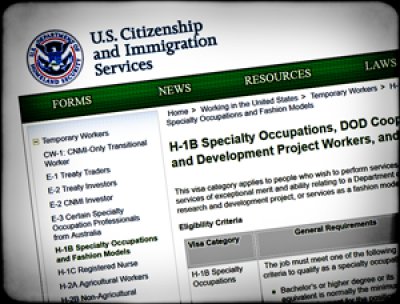
If the Trump administration really wanted to bring a little more prosperity to the American middle class, it would sharply curtail the large H-1B program (for high-tech workers) and would eliminate the H-4 work program, which opens up jobs for the alien spouses of the H-1B workers, a rather smaller program.
It has done neither.
What it has done, which may be more hat than cattle, is to tighten some rules on some abuses within the H-1B program that may only reduce the size of the program a bit, but it does show that the government is doing something in this field.
DHS has announced that it will take steps against the less powerful of the two economic forces that enhance their profits by the use of H-1Bs as below-market cost labor — the Indian outsourcing companies that play the middleman role in the rent-a-programmer business. The new rules will hardly be noticed by the other, more powerful force, the so-called solution companies, such as Microsoft, IBM, and Google.
The agency has announced that it will encourage its adjudicators to ask questions of employers to make sure that workers they have, in effect, farmed out to IT companies are really employed, are really in high-tech jobs, are really paid at the appropriate rates, and are kept in paid status even when there is no work to do. All of this is highly commendable, but is at the fringes of the main problem: the displacement of U.S. workers by foreign ones.
These matters, are, incidentally, covered much more thoroughly in the Indian press, such as in the Times of India, than they are in the United States.
Speaking of the Indian media, the best account of what is not happening regarding H-4 workers can be seen at the RedBus website for expatriate Indians.
For decades, the spouses (usually, but not always, wives) of H-1B workers have not been allowed to work; late in the Obama administration the rules were changed and a subset of those spouses — those whose partners had secured a place on the green card waiting list — were given permission to work.
When the new administration came into office, it said that it would reverse the Obama rules and ban work for the H-4s. It also inherited a lawsuit, filed on behalf of Save Jobs USA, an organization of IT workers that I know little about. That lawsuit, after a series of ups and downs, is still pending in the D.C. federal district court. DHS has asked repeatedly for a little more time to consider the matter, as the administration stalls on the question of undoing the prior Obama-era decision, something that it has hastened to do in other circumstances.
We keep hearing that the administration is about to do something about H-4s, but it keeps not happening.
Politically, it is much easier for the administration to move against H-4 than to do so with H-1B. It is a much smaller program, with 78,000 participants, about one-tenth to one-twelfth the size of the H-1B program. It has only a couple of years' history, as opposed to the decades of the use of H-1B. Most importantly, there is no major American lobby protecting the H-4 program, as these workers can work anywhere they want, and are not tied to any employer. The husbands of the H-4s, in effect, have no such freedom.
There is some support for the program from the H-1B-using employers, as it means that the H-1B workers are not the sole supporters of their families, in at least in those 78,000 cases. It is also backed by the government of India, as most of these spouses are Indians, as are their spouses.
One of the ironies of the H-4 program is its flip side. The last information I had, which is a year or so old, is that spouses of U.S. expatriates in India cannot work legally in the Indian economy. So if the Indian government were really smart, it would change its rules at the cost of a few hundred jobs in their country to strengthen their hand in securing employment for scores of thousands of their citizens here in the United States.
To end on a positive note: The USCIS announcement that it will be checking on abuses regarding H-1B employment by the outsourcing companies comes at a particularly useful time, just as H-1B users decide how many applications they want to file before the annual deadline around April 1. Maybe there will be some second thoughts on how many petitions to file.
Maybe.
